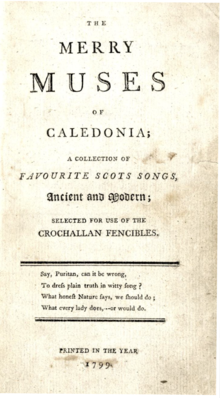Crochallan Fencibles

The Crochallan Fencibles was an 18th-century Edinburgh convivial men's club that met in Daniel ("Dawney") Douglas's tavern on Anchor Close, a public house off the High Street (part of the Royal Mile).[1] The 16th century doorway bore the inscription "O Lord In The(e) is All My Traist (trust)".[2]
History
Its name was made up from two sources: Crochallan is derived from a song, "Crodh Chailein'" ("Colin's Cattle"), which was a favourite of the then Landlord Daniel Douglas, and Fencibles was a name for regiments of garrison troops which were raised for the defence of Great Britain (an 18th-century Home Guard).[1]
William Smellie, the editor of the first edition of the Encyclopædia Britannica, was the founder of the club.[1] He reminisced that:
I wrote most of it, my lad, and snipped out from books enough material for the printer. With pastepot and scissors I composed it!
— William Smellie, at a meeting of the Crochallan Fencibles.[3]
The members of the club use military ranks to designate their positions in the club (as if it were a real fencible regiment), hence William Dunbar (died 1807) was the colonel of the club (rather than its chairman or president).[1][4]
Smellie introduced Robert Burns to the club in 1787. Burns compiled a book of popular songs for the club called The Merry Muses of Caledonia in which he writes of Smellie:[5]
And, though his caustic wit was biting rude,
His heart was warm, benevolent, and good.
Other members included Alexander Irving, Lord Newton and Adam Gillies, Lord Gillies.[6]
Dawney's Tavern was demolished in 1869.[7]
See also
Notes
- ^ a b c d Lindsay 2004a.
- ^ Grant's Old and New Edinburgh vol.2 p.235
- ^ Kogan 1958, p. [page needed].
- ^ Lindsay 2004b.
- ^ Woodward 1897, p. 401.
- ^ Grant's Old and New Edinburgh vol.2 p.235
- ^ Grant's Old and New Edinburgh vol.2 p.235
References
- Kogan, Herman (1958), The Great EB: The Story of the Encyclopædia Britannica, Chicago: The University of Chicago Press, Library of Congress catalog number 58-8379
- Lindsay, Rev. William (2004a), "Crochallan Fencibles", The Burns Encyclopedia, OCLC 54084607
- Lindsay, Rev. William (2004b), "Dunbar, William (d. 1807)", The Burns Encyclopedia, OCLC 54084607
- Woodward, Bernard Barham (1897), , in Lee, Sidney (ed.), Dictionary of National Biography, vol. 52, London: Smith, Elder & Co, pp. 400–401

